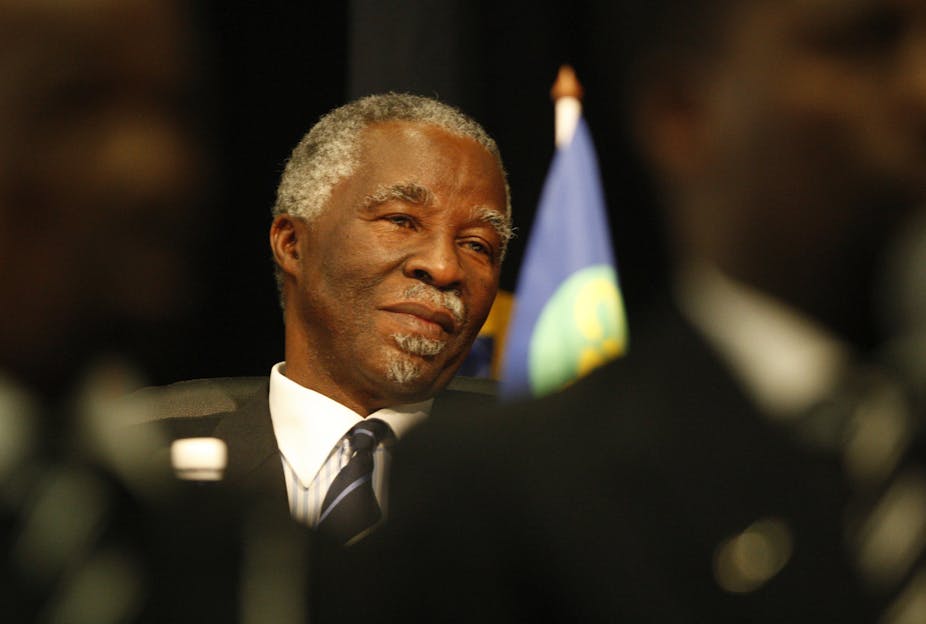A new book, “A Jacana Pocket Biography: Thabo Mbeki”, by Adekeye Adebajo, reflects on the legacy of the man some have called Africa’s “Philosopher king”. This is an edited extract.
Mbeki’s foreign policy was in part driven by his vision of an African Renaissance. He encouraged South Africans to embrace an African identity and sought to promote the continent’s political, economic and social renewal. He also sought to reintegrate Africa into the global economy.
Mbeki urged Africans to adapt democracy to fit their own specific conditions without compromising its principles of representation and accountability. He further challenged them to discover a sense of their own self-confidence. This, after centuries of slavery and colonialism which had systematically denigrated their cultures and subjugated their institutions to alien rule.
The African Renaissance did not naively assume, as some critics asserted, that this renewal was already under way. It merely sought to set out an inspiring vision and lay down the policy actions that could create the conditions for Africa’s rebirth.
Mbeki’s African Renaissance had as its central goal the right of African people to determine their own future. It called for cancellation of Africa’s foreign debt. It also called for an improvement in Africa’s terms of trade, the expansion of development assistance and better access to foreign markets for African goods.
He also pragmatically urged African governments to embrace the positive aspects of globalisation by attracting capital and investment with which to develop their economies.
Political scientists Peter Vale and Sipho Maseko have insightfully commented:
South Africa’s idea of an African Renaissance is abstruse, puzzling, even perhaps mysterious, more promise than policy.
With Mbeki as chief architect, the drafting of the New Partnership for Africa’s Development in 2001 and the birth of the African Union in 2002 were clearly attempts to add policy flesh to the skeletal bones of his renaissance vision.
There was certainly some truth to the criticism that the renaissance was devoid of substantive policy content. Seventeen African Renaissance festivals were held each May between 1999 and 2015 in different South African cities. Mbeki delivered keynote addresses at some.

But they mostly involved South African government, business, civil society leaders and musicians. Thus, they tended to be parochially focused on South Africa rather than the broader continent and its diaspora.
It remains a mystery why Mbeki did not use his ministers and other senior officials more effectively to promote the African Renaissance. And to seek to build grassroots support for the concept within South Africa and across the continent and its diaspora.
A rare example was the elegant speech delivered by Mbeki’s arts and culture minister, Pallo Jordan, “Thoughts on an African Renaissance”, at the Aardklop festival in Potchefstroom in 2005.
Despite talk of an African Renaissance, South Africa’s cultural schizophrenia was evident in the fact that its new rulers continued to refer only to its black population as “African”, leaving one wondering whether “coloureds”, Asians and whites were not also African.
Furthermore, many black South Africans still talked about the rest of Africa as if they were not part of it. The fact that so many symbols of apartheid still littered South Africa’s political landscape under Mbeki’s rule astounded many African visitors.
Most astonishingly, outside South Africa’s parliament – the deliberative body of Africa’s greatest hope – stood a statue of Louis Botha, a white military conqueror and prime minister, on horseback. Nothing could better symbolise South Africa’s cultural limbo, caught between a shameful past of arrogant European racism, and a future at which it was struggling to arrive as the midwife of Africa’s renaissance.
“A Jacana Pocket Biography: Thabo Mbeki” is published by Jacana Media.

